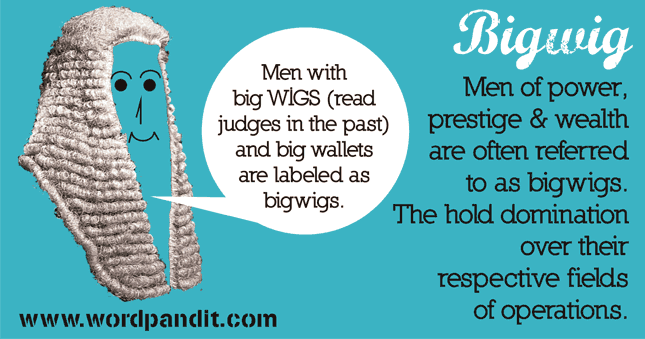As the word suggests, ‘bigwig’ is all about being big and important. As far as the dictionary definition goes, bigwig means ‘an important person, esp. an official (for examples: senators and other political bigwigs). Well, the ‘big’ part fits in perfectly with the anatomy of this word but where does the ‘wig’ part come from?
The wig part comes from ‘wig’, the peculiar piece used to cover the balding scalps of men and women. In times gone, the wig was not only a piece used to cover one’s embarrassing spots but also a symbol of one’s position in society. The trend of using wigs started in 17th century France, under the reign of Louis XIII. Well, he went bald prematurely and decided to go in for a wig. And soon the device of utility was converted into one that denoted prestige and status. Added to this was the fact wigs only could be afforded by the rich because they expensive as well as difficult to maintain.
This invention was too good to be restrained to French shores only and it soon migrated to the English mainland. And in England, wigs went a social transformation of their own. Men of rank and honour wore bigger wigs in comparison to normal people. The site of judges wearing these wigs is in fact a common sight that we have all seen.
And it is because of such a use that the word bigwig started to be used for people of importance.
Examples of its usage are as follows:
- Opposition bigwig proposes talks with NK leader.
- For those that are anxiously awaiting “The Daily”, iPad’s first magazine that is dedicated exclusively to the tablet computer and has the approval of Apple’s biggest; bigwig the wait will eventually come to an end.
- Robin Givens is also set to appear on the NBC show as a powerful agency bigwig who makes an intriguing offer to Casey.








amassing wealth in short period is a paragon of being a bigwig
People in the 1700’s began to wear wigs to cover up their heads which would become bald and have sores on them because of syphilis, which was widespread. Any man who had a loss of hair wanted to then wear a wig so as not to be ridiculed as possibly having syphilis. Regular smaller wigs were cheap. Big, large fancy wigs were 30 times as expensive as cheap wigs. Only the very rich important people could afford the big wigs. Hence they were know as “Big Wigs” which term became part of the common language.
Could it also be that it comes from the names of the “Bigwig” family in one of Charles Dicken’s Christmas “Nobody’s Story”?
http://www.online-literature.com/dickens/118/
hi carol
i think it is the other way around..
Charles Dickens seems to have used this word for its implications.
regards
Wordpandit
Hello i would like to like it where can i to the button
hey..there is a facebook like button at the bottom of the page..you can like it there..:)
we will add the post like button as well..